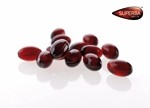Krill oil's metabolism benefits linked to liver gene control

According to findings published in Frontiers in Nutrigenomics, krill oil was associated with a down regulation of genes in the liver associated with the production of glucose, and those associated with lipid and cholesterol synthesis.
Researchers from krill player Aker Biomarine and LifeGen Technologies, a Wisconsin-based genomics company, also report that similar effects were not observed for fish oil, a result they describe as ‘surprising’.
“Overall, the data provide support for a role of krill oil in ameliorating abnormalities seen with obesity and insulin resistance; further studies in other animal models will be needed to confirm if the gene expression patterns observed in this study have effects on metabolic disease,” wrote the researchers.
Understanding krill
Krill are tiny shrimp gaining attention as a rich source of omega-3, as well as other nutrients.
There are about 85 species of the deepwater marine planktonic crustacean, or deepwater shrimp, which are the planet's most abundant animal biomass and which when captured and converted to oil, pack 48 times the antioxidant punch of standard fish oils, according to ORAC antioxidant scales.
New data
For the new study, researchers divided lab mice into three groups: One group was a fed a normal lab mouse diet containing 4% soybean oil; the second group received the normal diet plus fish oil (1.1% fish oil, 2.9 % soybean oil); and the third group received the normal diet plus krill oil (1.5 percent, 2.5% soybean oil). The krill oil used in the study was Aker Biomarine’s Superba Krill Oil-branded ingredient.
After three months of feeding, the researchers report that, of the 20,118 genes assayed, 4,892 genes were significantly changed in the krill oil group, compared with 192 genes in the fish oil group, compared to the control group. Of the 51 similar genes that were changed in both groups, 44 genes were changed in the same way: In other words, 7 genes were upregulated in one group and downregulated in the other.
Indeed, the researchers report that the genes for cholesterol synthesis were upregulated in the fish oil group of animals.
“Surprisingly, an [equivalent] dose of EPA and DHA derived from fish oil modulated fewer pathways than a krill oil-supplemented diet and did not modulate key metabolic pathways regulated by krill oil, including glucose metabolism, lipid metabolism and the mitochondrial respiratory chain,” wrote the researchers.
Despite the changes in gene expression, no changes in blood levels of lipids, glucose or insulin were observed by the researchers. They say this is “probably because the mice used in this study were young and were fed a low fat diet”.
Need for further research
"Clearly this study demonstrates that omega-3 fatty acids in phospholipid form, which is abundant in krill oil, is more bioactive than the corresponding triglyceride form of the omega-3 fatty acids,” said Dr Jamie Barger of LifeGen Technologies.
“This research builds upon the body of evidence supporting the theory that phospholipid-bound EPA & DHA is utilized more effectively. However, further research is necessary to explain why there is a difference between these two molecular forms of the beneficial fatty acids.”
Source: Frontiers in Genetics
2:45, doi: 10.3389/fgene.2011.00045
“Differential effects of krill oil and fish oil on the hepatic transcriptome in mice”
Authors: J.L. Barger, K. Berge, L. Burri, R. Berge
















